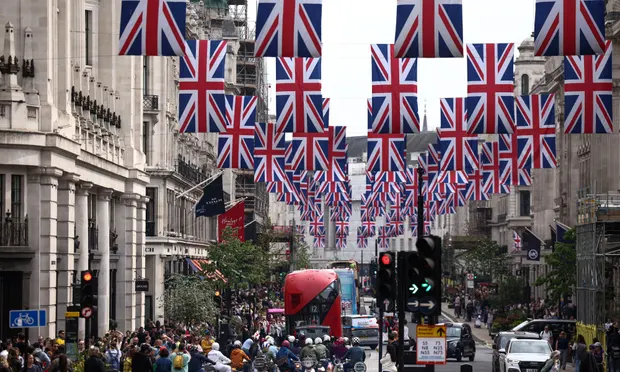King Charles’s coronation is a “chance to showcase our liberty”, a cabinet minister, has said, after the UK government fast-tracked legislation to crack down on protests.
The security minister, Tom Tugendhat, defended the new laws, which include a 12-month prison sentence for protesters who block roads and a six-month prison sentence or unlimited fine for anyone who locks on to others, objects or buildings. Police will also be able to stop and search protesters they suspect are setting out to cause “disruption”.
Official warning letters have been sent to anti-monarchists planning to stage peaceful protests at the coronation, but the cabinet minister insisted people will still have the “liberty to protest”.
“Empowering people to come together, freely, openly and demonstrating security can be a liberator, not like in authoritarian states where it is a controller.”
He said anti-monarchists would still “have the liberty to protest but they would not have the liberty to disrupt others. That’s where we’re drawing a difference”.
The security minister refused to be drawn on the guidelines to hosting a “non-disruptive protest”, to avoid people “finding loopholes”, but said planning for the coronation had been a very complex police and intelligence operation.
“We’re not just thinking of our own security but the security of heads of states, and we’re dealing with protest groups who have nothing to do with UK but to do with foreign leaders visiting the UK,” he said.
When asked if police had had enough time to process and digest the new laws they will be enforcing this week, Tugendhat said: “We passed the laws to give police powers they’ve asked for for months. This is not to do with coronation but we’ve seen the nature of protest become so much more disruptive and intrusive. We can’t deliver on the five pledges if we can’t get the economy going.”
Thousands of officers are being drawn from across the UK for the ceremonial event in a security operation called Operation Golden Orb. Hundreds of officers will line the route towards Westminster Abbey while plain-clothed police will be in the crowds and snipers will be situated on rooftops.
The man was arrested and detained at about 7pm after he approached the palace gates and threw a number of items, the Metropolitan police said. He was held on suspicion of possession of an offensive weapon after he was searched and a knife was found, but he was not carrying a gun.
Reacting to the incident outside the Palace, Tugendhat told Sky News: “I’m very glad to see the police reacted incredibly quickly, incredibly professionally to the incident last night. We’re in no way complacent and I’m very proud of the response the police have done.”
Police do not believe it was a terrorist incident, and the mental health history of the suspect is being examined. The man arrested is believed to have been acting alone and it is being treated as an isolated incident.
Specialists attended and after an assessment a controlled explosion was conducted as a precaution.
The minister refused to be drawn on how much the security operation around the coronation would cost, following reports the plan would cost the taxpayer around £100m. “It’s not a figure I recognise,” he said.
“It’s very difficult to pull that out as a separate figure, for the simple reason that we have got an enormous amount of effort going in for a major incident like this in different parts of the country – because there are people getting together in streets, there’s people getting together in gatherings across the country because this is a moment of national celebration.”
The king and the queen consort were not at Buckingham Palace at the time of Tuesday night’s incident. However, the king hosted Australia’s prime minister, Anthony Albanese, during an audience at the palace earlier on Tuesday.


